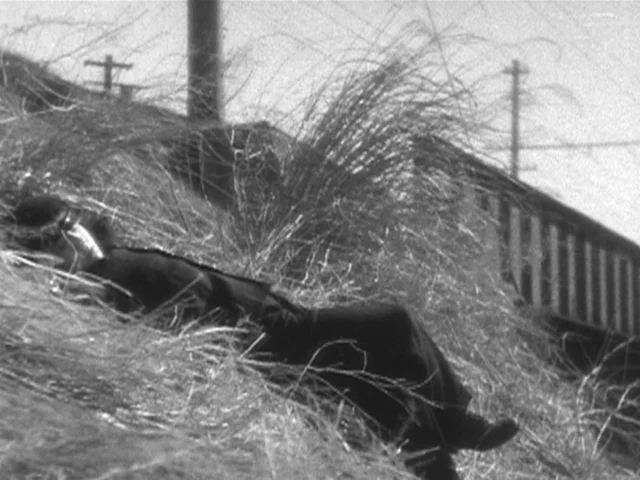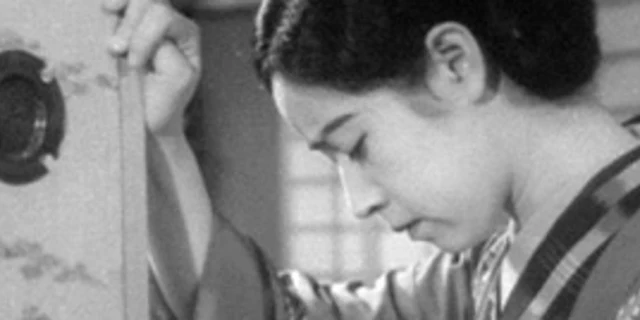One of Mikio Naruse's earliest surviving silent films, Apart From You is a fable in support of filial devotion. An aging geisha, Kikue (Mitsuko Yoshikawa), is trying to raise a teenage son, Yoshio (Akio Isono), but he has become ashamed of his mother's profession. When she discovers that Yoshio has been cutting school and has joined a gang, her friend and fellow geisha, the pretty young Terugiku (Sumiko Mizukubo), tries to help Kikue by showing Yoshio what her own dysfunctional family is like. The contrast with his own self-sacrificing parent inspires him to give up his adolescent rebellion. Though the film teeters on the edge of sentimentality, it's saved by the complexity of the characters, the performances of the actors, and the fluidity of the direction and camerawork.
A blog formerly known as Bookishness / By Charles Matthews
"Dazzled by so many and such marvelous inventions, the people of Macondo ... became indignant over the living images that the prosperous merchant Bruno Crespi projected in the theater with the lion-head ticket windows, for a character who had died and was buried in one film and for whose misfortune tears had been shed would reappear alive and transformed into an Arab in the next one. The audience, who had paid two cents apiece to share the difficulties of the actors, would not tolerate that outlandish fraud and they broke up the seats. The mayor, at the urging of Bruno Crespi, explained in a proclamation that the cinema was a machine of illusions that did not merit the emotional outbursts of the audience. With that discouraging explanation many ... decided not to return to the movies, considering that they already had too many troubles of their own to weep over the acted-out misfortunes of imaginary beings."--Gabriel García Márquez, One Hundred Years of Solitude
Search This Blog
Showing posts with label Sumiko Mizukubo. Show all posts
Showing posts with label Sumiko Mizukubo. Show all posts
Tuesday, August 6, 2024
Apart From You (Mikio Naruse, 1933)
Cast: Mitsuko Yoshikawa, Akio Isono, Sumiko Mizukubo, Reikichi Kawamura, Ryuko Fuji, Yoko Fujita, Tomio Aoki. Screenplay: Mikio Naruse. Cinematography: Suketaro Inokai. Art direction: Tatsuo Hamada.
Thursday, November 30, 2017
Dragnet Girl (Yasujiro Ozu, 1933)
 |
| Kinuyo Tanaka in Dragnet Girl |
Joji: Joji Oka
Kazuko: Sumiko Mizukubo
Hiroshi: Koji Mitsui
Misako: Yumeko Aizome
Senko: Yoshio Takayama
Misawa: Koji Kaga
Okazaki: Yasuo Nanjo
Director: Yasujiro Ozu
Screenplay: Tadao Ikeda
Based on a story by Yasujiro Ozu (as James Maki)
Cinematography: Hideo Shigehara
Art direction: Yonekazu Wakita
Yasujiro Ozu clung to silent film for a long time, but who needs sound when you and your cinematographer, Hideo Shigehara, can use the camera as eloquently as they do in Dragnet Girl? Early in the film, the camera explores an office setting, panning over rows of young women at typewriters, clocks slowly ticking away the workday, and rows of men's hats hanging in a hallway. In the last take, one of the hats drops from its hook, as if impatient for quitting time. One of the typists, Tokiko, is summoned from her machine to the office of the president, where she finds his son, Okazaki, who has been putting the moves on her by giving her jewelry, this time a ruby ring. She shrugs off his advances but accepts the ring -- she's living with a gangster, an ex-boxer named Joji, and it's his world that she prefers. This is one of Ozu's forays into the underworld made familiar to us by Hollywood, and it's permeated with echoes of Warner Bros. movies of the 1930s. American culture creeps in everywhere: Even the rules of conduct in a pool hall are written in English on the wall, and in the boxing gym that Joji frequents a sign proclaims the virtues of "The Manly Art of Self-Defense." When an eager young kid named Hiroshi shows up in the gym wanting to become a champion fighter, Joji takes an interest in him, and through him meets his sister, Kazuko, who works in a record store that prominently features the RCA Victor mascot, Nipper. Tokiko gets jealous of Joji's interest in Kazuko, but when she decides to emulate her rival by taking up knitting and other domestic pursuits, she and Joji quarrel. She storms out, but later returns to persuade Joji that it might be a good thing to go straight. Things get complicated, however, when Hiroshi, Joji's protégé, steals money from the cash register at his sister's store. Joji persuades Tokiko that they should pull off one last heist, robbing from the office where Tokiko works to get cash so Hiroshi can pay back what he stole. Ah, but crime does not pay. All of this melodramatic business is elevated not only by Ozu's sure-footed direction and attention to visual detail but also by the performances, especially that of Kinuyo Tanaka, who once again shows why she should be honored as one of the great film actresses. She has Bette Davis's toughness combined with Lillian Gish's gift for pathos.
Subscribe to:
Comments (Atom)



